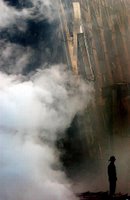 | ED456377 - A Survey of African American College Students: Reactions to the Terrorist Acts of September 11, 2001. Full text in PDF format. ERIC #: ED456377 Title: A Survey of African American College Students: Reactions to the Terrorist Acts of September 11, 2001. Authors: Duncan, Cecil. |
A survey instrument was developed to identify the impact the World Trade Center and the Pentagon bombings of September 11, 2001, had on African American college students attending an Historically Black College-University (HBCU) in the South. The survey was administered to 136 students 8 days after the bombings in an effort to gain insight into their immediate impact on a select group of Americans.
Students who participated in the study appeared to have experienced a number of reactions typical of persons who were in close proximity to a disaster but were not direct victims themselves. They did not have symptoms consistent with posttraumatic stress syndrome disorder.
Most had serious concerns about flying, while a sizable minority felt unsafe in general. Few blamed Middle Easterners in general for the terrorist acts, and even fewer wanted profiling to be used as a means of identifying terrorists. The respondents appeared to be doing what they needed to do to return to normalcy, and talking about the incident may be the most therapeutic thing they did. Several limitations of the study are discussed, including that it occurred just eight days after the bombings, which may have been too early to assess the impact on the participants. (JDM)















No comments:
Post a Comment